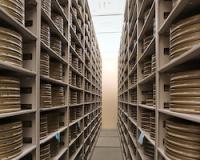
In this series of interviews, we highlight the diversity of work being done behind the scenes at UCLA Film & Television Archive to preserve and showcase the history of moving images.
What is your role as television archivist?
I’m responsible for overseeing the day-to-day activities of the television collection (which now numbers over 160,000 items): from acquisitions and donor/depositor relations; to processing and inventorying new acquisitions; to coordinating the production of reference copies for the Archive Research and Study Center; to programming television at the Billy Wilder Theater and other venues; and to preservation, mainly the preservation and restoration of 2" videotapes, but also other formats of tape, as well as film.
What aspect of archival work do you enjoy most?
I most enjoy transferring old 2" videotapes from the 1950s to the 1980s and being able to look at programs that no one has seen since they originally aired. Often when we transfer these tapes, we uncover really interesting, fun and historic programs. One of my favorite parts of the job is that over the years I’ve been able to meet and get to know so many of the great talents of television’s history — especially some of the directors from the "live" TV days. Every time I watch a live drama from TV’s Golden Age I marvel at how these men and women were able to produce such great works under the relatively primitive and stressful conditions under which they worked.
What are some of the challenges of archiving television?
Just trying to keep up with identifying, inventorying and processing the volume of material (film and tapes) that comes to the Archive.
The most challenging project by far was the restoration and preservation of the three Fred Astaire television specials (An Evening with Fred Astaire, Another Evening with Fred Astaire and Astaire Time), a project that took two long years and presented very difficult technical issues and other problems involving a great number of people and organizations. But the moment when the toughest technical problem was solved and an absolutely beautiful image suddenly appeared on the screen as if by magic, it's something I'll never forget. Emmy Awards for "Outstanding Achievement in Engineering Development" were awarded to the Archive plus three of us who worked on the program.
2-inch videoreels of the Dean Martin Show, Play of the Week and This is Your Life.
Could you tell us about the UCLA Festival of Preservation projects you worked on?
We received some funding from (what was formerly known as) the UCLA Moving Image Archive Studies program to transfer about 30 shows dealing with race, poverty, mental illness and drug abuse. Play of the Week: "Seven Times Monday" and Our Kind of World went really well together because they both involve African-American families and working-class issues. "Seven Times Monday" is interesting because it was authored by Ernst Pendrell, who wrote it in the the mid-1950s with a Jewish protagonist. When it was transposed to this television version they turned it into a black family, but they didn't change the script at all, so there's no overt references to race — everything there is kind of subtext.
The three musical shows on March 17 feature performances by jazz legends, like Nancy Wilson on her opening night at the Cocoanut Grove. They're preserved from the original 2" tapes that came to us from KTLA, which broadcast all three programs in 1965. On March 26 we present Visions: "Gold Watch," which centers on a Japanese-American family in the aftermath of the Pearl Harbor attack. That 2" tape was deposited with the Archive by KCET along with lots of other KCET productions from the station's debut in 1964 through the 1980s. We were contacted by the Women’s Film Preservation Fund - New York Women in Film & Television about working with the Archive to preserve films made for television in which women played a significant off-screen creative role: i.e. producer, director, screenwriter, editor. They funded the preservation of four episodes of Visions that we had on 2" tape, including "Gold Watch," which was produced by Barbara Schultz. I thought it was the best of the four and especially timely, as it concerns current events (immigration, the 75th anniversary of Executive Order 9066).
What’s an underrated show more people should know about?
My favorite show, End of the Rainbow, a short-lived series that ran on NBC in early 1958 [see catalog record].
2-inch videoreels of the Steve Allen Show.
2017 UCLA Festival of Preservation screens March 3 - 27. See the complete schedule >
—edited by Jennifer Rhee, Digital Content Manager
< Back to the Archive Blog






 Mobile Navigation
Mobile Navigation

